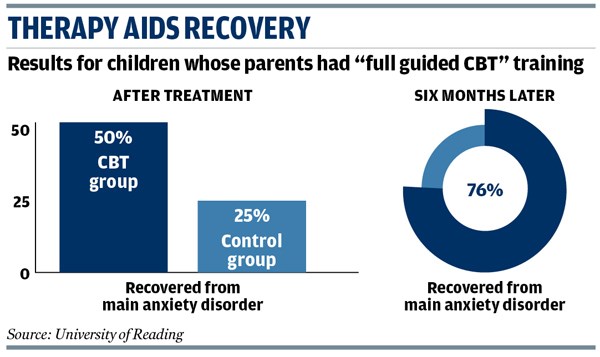How parents deliver CBT to help their children beat anxiety disorders
Emily Rogers
Monday, October 12, 2015
Project helps children recover from anxiety.

Project
Guided parent-delivered CBT for childhood anxiety
Funding
£278,696 from the Medical Research Council towards the cost of the trial
Background
Between five and 10 per cent of children suffer from anxiety disorders, which can affect their emotional and social development and lead to depression if left untreated. Early intervention is crucial and cognitive behavioural therapy (CBT), which helps people overcome difficulties by changing how they think and behave, is seen by professionals as an effective treatment. However, there are often long waiting lists for CBT.
Researchers at Reading University's Anxiety and Depression in Young People Research Unit were inspired by an Australian study, which involved training isolated rural parents to deliver CBT to their children at home. They went on to embark on a trial to investigate whether a similar approach could increase the accessibility of CBT for UK children and work out how much guidance from a therapist was needed to get the best results.
Action
All children involved in the trial had been referred to Berkshire Child Anxiety Clinic, now called Berkshire CAMHS (Child and Adolescent Mental Health Services) Anxiety and Depression Pathway, jointly run by Berkshire Healthcare NHS Foundation Trust and Reading University. All had an anxiety diagnosis meeting the treatment threshold. Conditions included social phobia, separation anxiety and panic disorder.
Between April 2008 and December 2010, 194 sevento 12-year-olds were recruited. Sixty four were randomly selected for "full guided CBT", which involved their parents receiving five hours and 20 minutes of therapist guidance over eight weeks.
Sixty-one children were allocated "brief guided CBT", which involved two hours and 40 minutes of guidance and the remaining 69 were placed on the waiting list as the control group.
Nineteen therapists attended a training day to prepare them for supporting parents and had weekly supervision sessions with a clinical psychologist over the trial period.
All parents were given a self-help book, instructing them on delivering CBT strategies with their children. Those on full guided CBT received four weekly hour-long face-to-face support sessions with therapists, as well as four 20-minute telephone support sessions. Those receiving the brief version of support had two fortnightly hour-long face-to-face sessions and two 20-minute telephone sessions.
Therapists helped parents work through the manual and solve any problems that arose.
"Therapists can only have a fairly limited impact on what's going on in children's daily life and we often rely on parents to help facilitate therapeutic work between sessions," says lead researcher Dr Kerstin Thirlwall.
"This approach takes this further, by providing parents with the skills to incorporate a CBT approach into family life."
Guided parent-delivered CBT is now routinely offered at the Berkshire clinic and has been introduced to CAMHS services in areas including Oxfordshire, Dorset and Jersey.
Outcome
Findings from the trial were outlined in a University of Reading paper published in the British Journal of Psychiatry in August 2013.
Half of the children who had received full guided CBT recovered from their main anxiety disorder after treatment, compared with 25 per cent of the waiting list children, according to assessments of 159 families. Of those who had received brief-guided CBT, 39 per cent - 18 children – recovered from their main disorder after treatment.
A third of children in the full guided CBT group recovered from all their anxiety disorders, compared to 11 per cent of those on the waiting list and 15 per cent of those whose parents received briefer support.
After six months, 76 per cent of the children in the full guided CBT group and 71 per cent of those whose parents received briefer support had recovered from their main anxiety disorder, revealed follow-up assessments of a total of 87 children.

If you think your project is worthy of inclusion, email supporting data to derren.hayes@markallengroup.com




